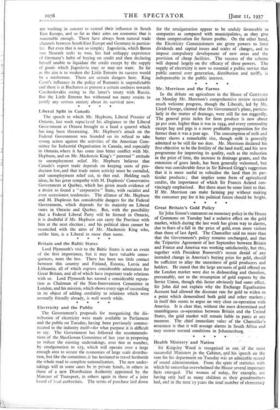Great Britain's Gold Policy Sir John Simon's statement on monetary
policy in the House of Commons on Tuesday had a sedative effect on the gold market, which during the last week has given way to alarms, due to fears of a fall in the price of gold, even more violent than those of last April. The Chancellor said no more than that the Government's policy remains unchanged, and that the Tripartite Agreement of last September between Britain and France and America was working satisfactorily, but this, together with President Roosevelt's recent denial of any intended change in America's buying price for gold, should be sufficient to allay the uneasiness of gold producers and holders. He stated that the large ampunts of gold offered on the London market were due to dishoarding and therefore, presumably, not to the resumption of gold exports by the Soviet Union, though this factor obviously had some effect. Sir John did not explain why the Exchange Equalisation Account had allowed the discount rate for gold to widen to a point which demoralised both gold and other markets ; in itself this seems to argue no very close co-operation with America. It is clear that, without the most determined and unambiguous co-operation between Britain and the United States, the gold market will remain liable to panic at any moment. The chief. immediate value of the Chancellor's assurance is that it will assuage alarms in South Africa and may restore -normal conditions in 'Johannesburg.
























































 Previous page
Previous page